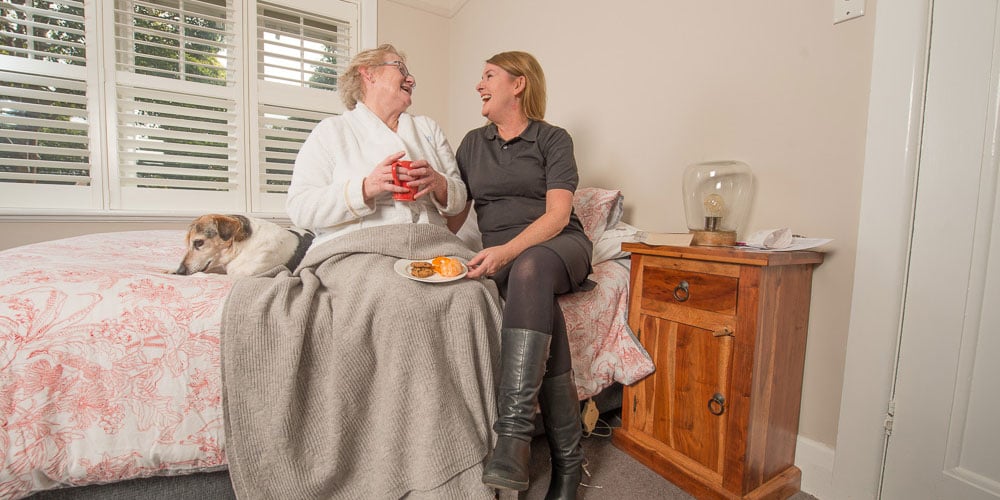Our home is our sanctuary. It is where we feel most at ease, a place where we have established some sort of routine and support system that we are familiar and comfortable with.
It is therefore understandable, to say the least, that leaving one’s home to live in a long-term care facility can be, well, scary.
But it’s something that plagues many’s minds as one grows older – the increasing age-related health challenges that make living independently at home more difficult, if not impossible. That doesn’t mean we must leave our homes, though.
You see, there is this thing called “senior home care”. In short, it is what gives us the support to continue living at home even when we have some sort of health issues.
This article will explore what senior home care is, the different services that are being offered, as well as how to choose the right provider for you or your loved one.
Ageing in Place
Have you ever heard of the term “aging in place”? Basically, it means living in one’s own home and community independently and comfortably, regardless of age, income or level of capability.
Ageing in place is now the preferred option among many senior citizens. According to a report,
“The overwhelming majority of people aged 65 years and over would prefer to ‘age in place’, in their own homes and local communities.” Australian Nursing and Midwifery Journal
And it’s not hard to understand why. Here are just some of the many reasons as to why seniors prefer ageing in place:
- As we age, our home becomes more familiar and cozy to us. Our house is filled with memories and objects of sentimental value. Leaving such a home can be emotionally challenging.
- Staying in our home allows us to maintain our independence. We can stick to our usual routines and not depend on others.
- Aging in place is often more cost-effective than other living arrangements such as moving into a long-term care facility.
Types of Home Care for Seniors
There are two main types of home care for seniors: government-funded and privately funded.
Government-Funded Senior Home Care
Government-funded senior home care is designed for low-income seniors and those with few assets. To be eligible, you must first undergo a needs assessment by an aged care assessor.
Amongst other things, the assessor will look at your living situation, health and personal circumstances to determine if you’re eligible for government-funded care, as well as what sort of care you need.
Private Senior Home Care
Private senior home care is designed for seniors who can afford to pay for their care. It is not means-tested so anyone can choose to use private home care services.
What Services Are Included in Home Care?
Whilst the type of services included in every home care varies according to the provider, some standard services include:
- Personal care i.e. help with showering, dressing, and toileting
- Meals and nutrition i.e. meal preparation and assistance with eating
- Housekeeping i.e. vacuuming, dusting, and laundry
- Transportation and help with running errands or getting to appointments
- Companionships i.e. conversation and social activities
- Respite care for caregivers (who needs a break)
How Do I Know if Home Care is Right for Me or My Loved One?
Ageing in place is a popular choice for seniors. It allows one to maintain his/her independence and be in familiar surroundings while still getting the support one needs.
But how do you know if home care is suitable for you or a loved one?
Consider the following questions:
- With some extra help, can the person live independently?
- Are there any home safety concerns?
- Do they have a support system?
- Is the home accessible and in good repair?
- Are there any financial concerns that need to be considered?
If your answer is yes to most of these questions, home care might just be a good (and right) option to consider. However, it would be best to always speak to a doctor or other medical professionals to get their opinion before making any decisions.
Living at home while you age does have its many benefits but keep in mind it is not suitable for everyone. Home care might not be the right choice in the case of:
- Complex medical needs that can’t be met at home
- Lack of support systems in place
- An unsafe home, or one that needs extensive repair
- Severe cognitive decline
How to Choose a Home Care Provider
Finding the right in-home care provider takes time, effort and understanding. To identify and eventually choose the best possible care solution for an aging parent or loved one can therefore be very challenging, especially when there so many options to choose from.
The following tips will help simplify your search for an in-home care provider and ensures that you make the best decision according to your situation.
Define Your Specific Needs and Wants
Before beginning your search for an in-home care provider, sit down with your family and discuss the unique situation and specific needs of your ageing parent or loved one.
This will help you narrow down your choices and identify the type of home care provider that fits best.
Some questions you’ll want to consider include:
- Where do you need help? Are you looking for help with daily living, including showering, dressing, and eating?
- Are there any specific medical conditions to consider?
- What are the preferred living arrangements?
- What is the budget for home care services?
- What are the schedules and availability of family and friends who can provide support?
Research Your Options
Once you understand your specific needs, it’s time to start researching your home care provider options. There are various types of in-home care providers, each with its own unique set of services and offerings.
Do your research and compare the different types of providers to find the best fit for your family’s needs.
Compare Apples With Apples
When considering different in-home care providers, you want to compare apples with apples. Make sure you’re looking at providers that offer the specific services and support that your aging parent or loved one needs.
Some factors you’ll want to compare include:
- Services offered
- Cost of services
- Location and availability
- Qualifications and experience of staff
- Reputation and reviews
Schedule Consultations
Once you’ve identified a few potential in-home care providers, it’s time to schedule consultations. This is your chance to meet the provider, ask questions and test their services.
Observe how well the staff interacts with your aging parent or loved one and pay attention to any red flags that may come up during the consultation.
You also want to keep an eye out for any provider that seems more interested in selling their services than actually providing care.
Get Everything in Writing
Before making your final decision, make sure you get everything in writing through a caregiver contract. This includes a detailed description of the services offered, the cost, and the provider’s policy on cancellations and changes.
By doing your research and understanding your needs, you can be confident that you’ve chosen the best possible in-home care provider for your ageing parent or loved one.
How to Prepare Your Home for In-Home Care
Once you’ve chosen an in-home care provider, there are a few things you’ll need to do to get your home ready for their arrival.
Schedule a Home Safety Assessment
Before starting services, most in-home care providers will offer a free home safety assessment. This is an opportunity for them to identify any potential hazards in your home and make recommendations to keep your loved one safe.
Make Some Changes to Your Home
Based on the home safety assessment results, you may need to make some changes to your home. This can include fitting grab bars in the bathroom, removing throw rugs, or adding stair rails.
Stock Up on Supplies
You’ll also need to stock up on supplies like food, toiletries and medications. Be sure to ask your in-home care provider what is recommended for you to have on hand.
Prepare For Their Arrival
Finally, prepare for your in-home care provider’s arrival. This could include making a list of instructions for them, setting up a designated workspace and providing them with a key to your home.
By taking these steps, you can be confident that you’re providing your in-home care provider with everything they need to deliver quality care to your aging parent or loved one.
Safety Tips for Ageing in Place
If you’re ageing in place, there are a few safety tips you should keep in mind to help you stay safe and healthy:
- Get regular checkups and screenings to help identify any health concerns early on.
- Stay active and eat a healthy diet to maintain your strength and energy levels.
- Stay connected with friends and family and participate in activities you enjoy. This can help reduce stress and isolation.
- Ensure your home is safe by installing grab bars in the bathroom, handrails on the stairs and remove any potential trip hazards.
- Have an emergency plan in place in case of fire, power outages or other emergencies.
By following these safety tips, you can help ensure that you age in place safely and comfortably.
At Absolute Care and Health, we understand that everybody’s needs vary so we offer a range of services to support seniors in their homes – from primary home care and cleaning to more specialised services like dementia care and palliative care, we’ve got them all covered. We know that deciding to get help at home can be difficult. Still, our team of experienced and compassionate carers will work with you to tailor a care plan that’s just right for you. So call us today at 03 9827 8899 to get started.






